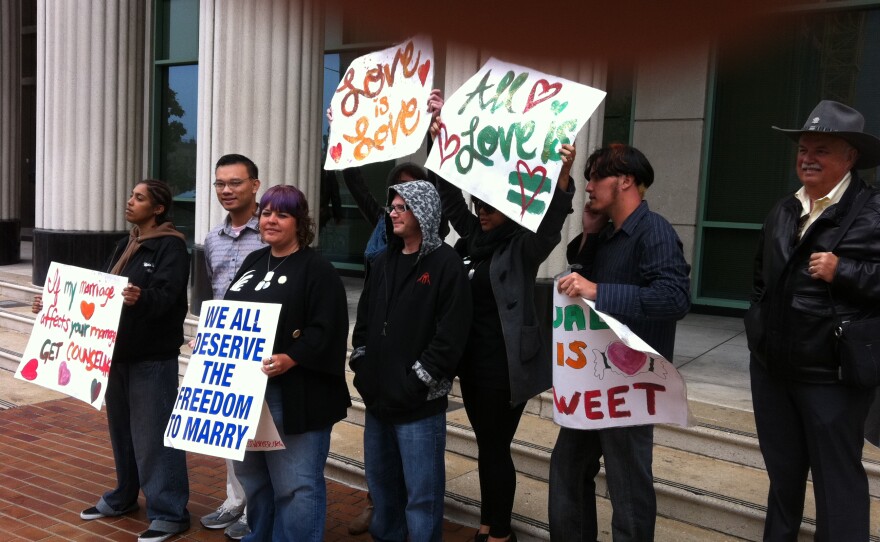The competing interests of same-sex marriage, property rights and free speech have all come together in a lawsuit, brought by Target, to keep political activists from approaching customers at the front of their stores. This San Diego case is one of many in which courts have been asked whether stores and shopping centers have become modern-day gathering places where political debate must be allowed.
The facts in the case are in dispute but here’s the basic story.
Members of a group called Canvass for a Cause have been standing near the entrances to Target stores in San Diego where they approach shoppers to talk about gay marriage. This group is on the pro side. They ask for donations, they ask people to sign up to help the cause and try to talk with them about the issue.
In its lawsuit, Target said the group has behaved like a moralistic inquisition and it harasses shoppers. Canvass for a Cause begins by asking people if they support gay marriage. One Poway store manager said in the Target lawsuit:
“Whenever our customers say no, whether it is about making a donation, signing a petition, or about support for gay marriage, the solicitors become angry and aggressive, continuing to challenge our customers on their morals. I have seen them tell our customers not to vote if (the solicitors) are unhappy with the customers’ views.”
The manager added, “Our store receives, on average, eight to 10 complaints per day about Canvass for a Cause.”
The activists tell a different story.
“It’s hyperbole to say our volunteers get agitated,” said Canvass for a Cause executive director Tres Watson. “Do we challenge their beliefs when they say they oppose gay marriage? Sure. But 90 percent of the time people tell us, ‘I don’t want to talk about it,’ and we say OK.”
Lawyers for both sides appeared in court today in a hearing over a preliminary injunction to keep activists away from the stores while the case is pending.
Target attorney David McDowell said the law doesn’t really care whether activists are rude or respectful. “Even if they were extremely polite, we could still ask them to leave,” he said.
McDowell told Judge Jeffrey Barton that Target has the right to evict any activist or fundraiser from the front of their store based on the store’s no-soliciton policy. The area is private property, they say, and it doesn’t matter if people are lobbying for gay marriage, trying to win souls for Jesus or selling Girl Scout cookies.
California has been at the vanguard of insuring free speech in shopping malls. A California Supreme Court case from 1979 (lawyers call it the Pruneyard case) said that shopping centers and malls, where people come to gather and socialize, constitute public forums where political speech must be allowed. But it gets more complicated when the area in question is not a place for milling around, eating fast food and going to movies... it’s simply the front of a Target store.
Attorney Bryan Pease, who represents Canvass for a Cause, said the Pruneyard case does apply to Target and the company should not be granted the injunction they're asking for.
“The Pruneyard decision applies to all large retail shopping centers, and the Targets we’re talking about in this case are part of large retail shopping centers,” he said.
Target said in a statement that their lawsuit is meant to insure shopping is hassle-free and it has nothing to do with the issue of same-sex marriage. Target’s record on gay rights has been mostly positive. The Minnesota-based corporation offered domestic-partner benefits to their employees long ago. But last year the store got some heat after it made a big donation to a Republican gubernatorial candidate who opposed gay marriage.
Target said their endorsement was related to business issues and had nothing to do with gay rights.
The judge said he will render a ruling on the issue of the preliminary injunction by the end of next week. The trial in the case of Target Corporation v. Canvass for a Cause, if it goes ahead, isn’t expected to begin until the summer.






